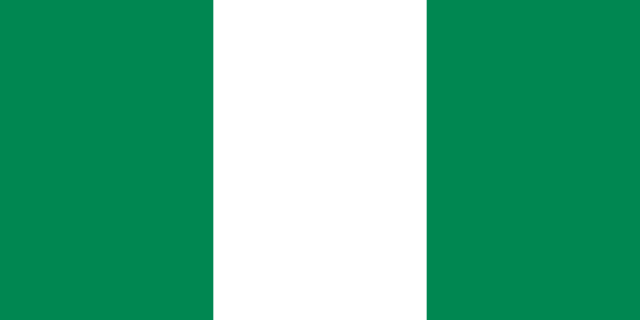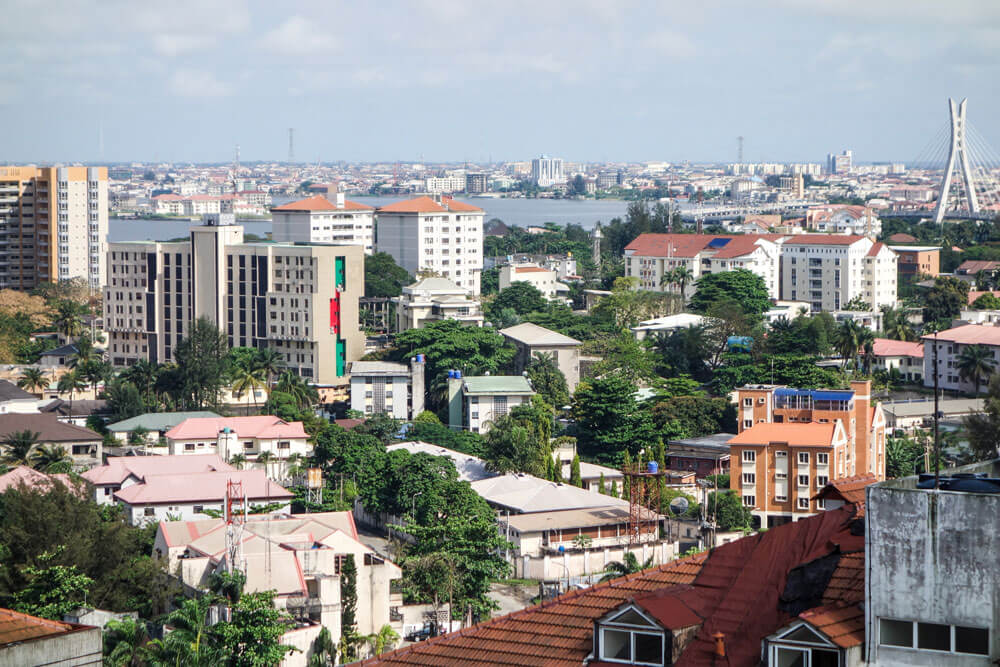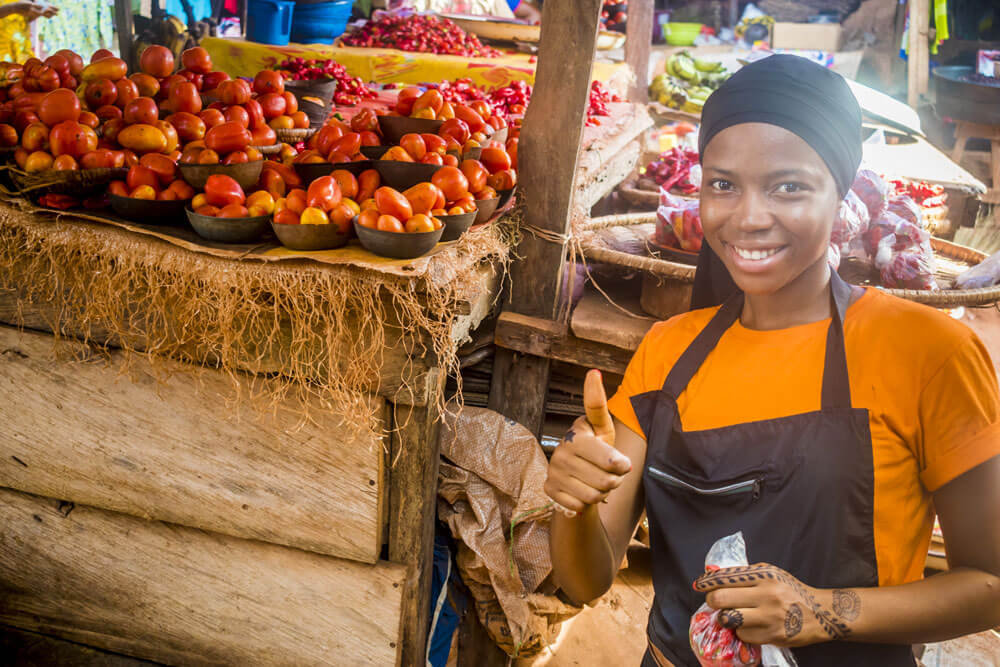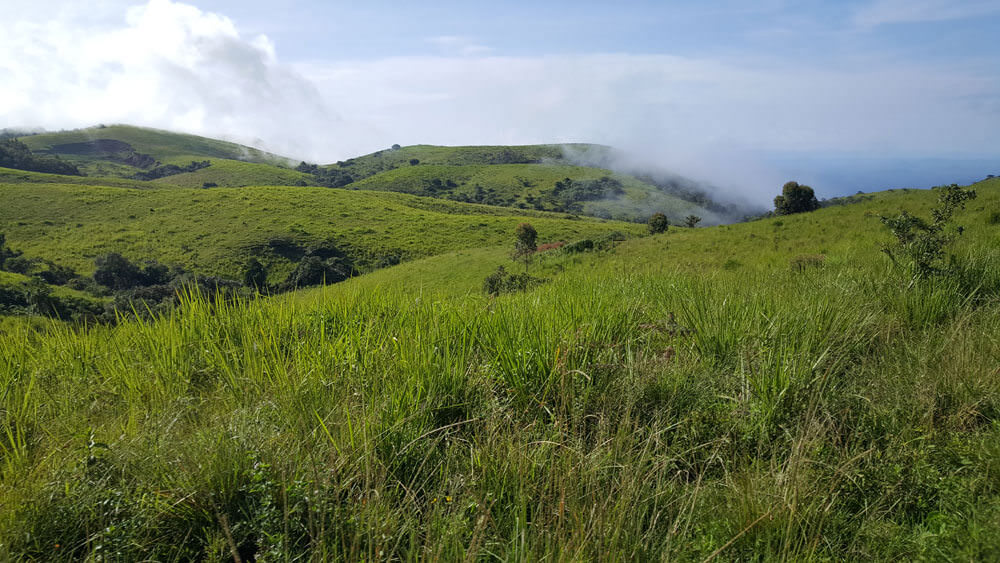Nigeria

Capital city: Abuja
Population: 211,400,708 (2021)
Land area: 923,769 km²
Official language: English
Legal system: A mixed legal system based on English law, Common law, Customary law and Sharia (Islamic) law.
Time zone: GMT+1
Currency: Nigerian naira (NGN)
GDP: 360.00 USD Billion (2021 est.)
Main industries: Petroleum, tourism, agriculture, mining
Principal exports: Crude petroleum, petroleum gas, scrap vessels, flexible metal tubing, cocoa beans
Officially known as the Federal Republic of Nigeria, Africa’s most populated country is located along the continent’s western coast, with the Gulf of Guinea laying in the middle of the state’s southern coastal border facing the Atlantic Ocean. With a total land area of 910,770 km2, Nigeria is bordered by Niger in the north, Benin in the west, and Chad and Cameroon to the east. Topographically, Nigeria has a diverse variety spread across the expanse of its territory; plains decorate the north and south regions of the country with beautiful arching plains that flow into characteristically shallow valleys that are littered with crystalline inselbergs. The capital of Nigeria is Abuja though previously it was Lagos up until 1976; the latter still retains its importance as the country’s commercial and industrial centre.

Demographics
Nigeria has the largest population in the African continent with an estimated population of 219,463,862 with a population density of 226 per kmsq according to July 2021 estimates, ranking 7th globally. 52.7% of the Nigerian population dwells in urban areas spread out but with dense clusters in the north and southwestern areas and a concentration of almost 15 million citizens in Lagos. 62% of the population is below the age of 25.
Nigeria is home to more than 250 diverse ethnic groups, the major groupings being the Hausa that make up almost one-third of the population, followed by the Yoruba (15.5%), the Igbo (15.2%), the Fulani (6%), the Tiv (2.4%) and the Kanuri/Beriberi (2.4%) whilst the remaining 25% are made up of smaller ethnic groups.
Due to the large variety of ethnic groups, almost 500 known languages are spoken across the country; though English is the official language, the lingua francas are Hausa, Yoruba, Igbo and Fulani. Muslims make up 54% of the population followed closely by Christianity which is practised by 45% of the society (10.6% Catholic, 34.3% others).

History
The earliest evidence of human settlement in Nigeria dates back several millenniums to 500-200 BCE; the people, known as the “Nok culture”, were named after the village of Nok wherein people raised crops and cattle and largely resided in what is near the northwestern region of Nigeria besides the Kaduna River. The people were known for their heavy use of adornments and changing bodily features giving inspiration to the art found in Nigeria today especially the symbolic terra-cotta figurines. Later on, many kingdoms and pre-colonial empires arrived and spread across the land. In the north, the Hausa states, Kanem Bornom the Jukun states and the Wukari all developed complex systems of governance whilst in the south the states of Yoruba, the Edo state of Beninm the Itsekiri state of Warri, the Efik state of Calabar, and the Ijo city-states all thrived in their respective vicinities. Fighting amongst these states and in-fighting between the chiefs and alafins (rulers) led to the collapse of major empires such as the Oyo Empire, leading to mass distributions of populations between the north and the south.
The British formally began the expansion of their influence through the Royal Niger Company, a consortium of various British companies, that was given a charter of incorporation authorization in 1886 to navigate the Niger delta along the banks of the Niger and Benue rivers. It competed with German forces in the southeast and the French in the west for trade as well control over territories now located in Sudan. Due to territorial tensions between the Company and the Lagos Protectorate that was annexed by Britain in 1861 (that consisted mainly of Yoruba states), the Company was annulled and its charter was handed to the British Imperial Army on 1 January 1900. Soon after, British forces began subjugating the dominant empires of the states spread across the territory; the first high commissioner, Frederick Lugard, was known for his defeat of the Fulani emirs, and after the fall of Sokoto in February of 1903, the entire territory came under British Rule, although fighting continued for long after, such as the war against the Ijebu in the south that continued until 1914. Many deposed emirs and leaders continued guerilla operations against the British, most notably the Ekumeku forces consisting of Igbo youths from all over the regions and who later on became a vital source of Igbo nationalism.
The nation was divided into the Protectorate of Northern Nigeria and the Protectorate of Southern Nigeria, with Zunugeru and Lagos becoming their respective capital cities. After 1914, on the advice of Lugard, the two protectorates were merged forming the Colony and Protectorate of Nigeria which was governed by an appointed governor residing in Lagos, up until 1954. The administrative system style in Nigeria was mostly that of “indirect rule”; the local governments of traditional chiefs were majorly left untouched and put under the direct supervision of English officials that eventually produced a sophisticated domestic government, especially in the emirates. The British rule introduced western educational systems, the English language, Christianity, and intricate transport and communications systems. During this period, the Nigerian economy developed into a cash crop exporting economy, specialising in cacao, peanuts, and other related raw material commodities. Consequently, many migrated across the country looking to work in urbanised areas to earn their wages.
Due to greater adaptation of Western values in the south, and the British strategy of “divide and rule”, the development and political freedoms (as long as officials were willing to cooperate with the British) were far better in the south than in the north where Muslims denied the teachings of Christian missionaries. The British ensured that the two groups were kept as separate as possible but the disparity only fuelled political tensions between the two administrative areas. Whenever protests arose the British adopted a conciliatory approach and opted to provide political reforms to quell unrest. Eventually, the Legislative Council of Nigeria, established in 1914, became large and robust enough to establish strong political parties, notably the Nigerian National Democratic Party and the Nigerian Youth Movement that came to being in 1934. The leader of the NDP, Herbert Macaulay, known as the “father of modern Nigerian nationalism”, began advocating for Nigerian independence in 1944; he and Nnamdi Azikiwe, a US-educated Igbo, mobilised more than 40 different political groups to form the National Council of Nigeria and the Cameroons (NCNC) that then utilised all platforms such as media and education to protest against British rule. Despite granting a federal government and internal self-governance, noting the continued dissatisfaction of the people, the British deployed the Willink Commission to examine the issue, and after vowing to create a government that will not allow discrimination against minority groups, the Nigerian political factions gained independence on the 1 October 1960. Following independence, a parliamentary system of government was established with Azikiwe, as head of the NCNC, being elected as the prime minister and ceremonial head of state. After the UN referendum that rejoined the Northern and Southern regions of Cameroon into a separate territory, Nigeria became a republic on 1 October 1963 and the Northern People’s Congress (NPC) leader, Abubakar Balewa, became Prime Minister with Azikiwe becoming President.

Key dates
1861-1914 Colony and Protectorate of Nigeria formed, governed through local leaders
1922 Kamerun, a former German colony, is added to Nigeria under the League of Nations mandate.
1960 Independence on 1 October; Prime Minister Sir Abubakar Tafawa Balewa becomes Prime Minister
1979 Elections bring Alhaji Shehu Shagari to power as President.
1999 Olusegun Obasanjo sworn in as president.
2003 First civilian-led election since the end of military rule. Olusegun Obasanjo was elected for a second term.
2003 In September, Nigeria’s first satellite, NigeriaSat-1, was launched by a Russian rocket.
2007 People’s Democratic Party’s Umaru Yar’Adua wins the presidential election.
2015 Muhammadu Buhari wins the presidential election held in March and historically becomes the first opposition candidate to do so.
Government and Legal System
Under the 1999 constitution, Nigeria is a federal republic with a presidential system of governance whereby the President is elected for a 4-year term directly via elections, becoming both the head of state and the chief executive. The President nominates both the Vice President and members of the cabinet. Under the constitution, Nigeria has a bicameral legislature consisting of the House of Representatives, wherein 10 members are chosen from each state for a term of 4 years, and the Senate wherein each state chooses 3 members along with 1 official from the Federal Territory, also for a term of four years. Currently, Nigeria consists of 36 states and the Federal Capital Territory and the constitution allows for more states to be created if needed.
Nigerian legal and judicial systems are based on three codes of law which are customary law, Nigerian statute law (which follows the common law), and the Shari’ah (Islamic) Law. The customary laws are implemented by customary courts that, especially for cases about familial disputes, is led by Kadis (judges) and other such traditional leaders. In the case of conflict between federal and state legislation, federal law prevails. The Supreme Court, Nigeria’s highest court, is headed by the chief justice of Nigeria.
Economy
Nigeria’s economy is one of the largest in Africa, due to the size of its population and its oil industry which has been the state’s primary source of revenue along with natural gas since the late 1960s, and nowadays both combined account for 10 per cent of total GDP. Recently, other sectors have expanded production such as mining and quarrying and ICT. Commodity wise, Nigeria is a top exporter of cocoa and rubber and in terms of services, the sector employs 52% of the population and contributes 52% of the state’s GDP. Nigeria’s agricultural sector is a key contributor to GDP and employs 36% of the workforce. Although Nigeria has vast and arable lands across the territory, the densely populated southern states do not have enough cultivable farmland due to which they migrate across the country looking for employment. Nigeria’s main cash crops include palm oil, rubber trees, and cacao whilst food crops like cassava, yams, taro, grains and rice are the main food crops. Due to a lack of productive capacity, Nigeria has begun to focus on other sectors to bolster infrastructure and promote agrotechnology.
Trade
In 2020, Nigeria’s GDP amounted to US$432.3 billion. Exports for the year were predominantly mineral fuels, oils, and other distillation products comprising 89% of total exports, the remaining value coming from ships, boats, and other floating structures (6.2%), cocoa (1.0%), and oilseeds (1.0%). The main export destinations were India (15%), Spain (11%), Netherlands (8.6%), South Africa (7.7%), and China (5.1%). For 2020, Nigeria mainly imported machinery such as nuclear reactors and boilers (19%), mineral fuels, oils, and distillation products (15%), vehicles other than railways and tramways (10%), electronics (7.0%), and pharmaceutical products (5.4%). Notable source countries were China (29%), the United States (9.1%), India (8.0%), Netherlands (7.8%), and Belgium (3.8%).
The nation is party to several international trade agreements, such as the United States African Growth and Opportunity Act and the Joint Declaration on Cooperation with the European Free Trade Area. Additionally, Nigeria also has multiple bilateral trade agreements, 15 of which are in force. The country also co-founded the Economic Community of West African States and is a member of the African Continental Free Trade Area.
Investment Opportunities
After a redaction of 1.8% during peak COVID-19, Nigeria’s economy is set to grow at an annual rate of 2.6% according to predictions till 2026. The Nigerian government acknowledges the benefits of economic diversification and has a vast amount of resources with the potential to grow stupendously. These include priority sectors such as manufacturing of food products, machinery, tools, flat sheet mills, and chemicals; mining and mineral processing of gemstones, coal, zinc and lead etc.; and cryptocurrencies and blockchain investments. The Nigerian authorities are also encouraging investors who wish to invest in Nigerian real estate and financial and banking services; the Nigerian Export Processing Zone is one of the leading export zones that requires investment companies to ensure that their industries are environmentally friendly and sustainable.
Investment incentives include tax holidays and credits, especially for pioneer companies establishing new industries or expanding vital economic sectors, capital and investment allowances, tax exemptions, duty subsidies, export expansion grants and development funds and also double taxation reliefs.
Other incentives include a debit-conversion programme allowing enhanced foreign exchange rates for foreign companies and loans from the Bank of industry and other such development banks, particularly for small and medium-scale industries. The Raw Materials Research and Development Council allots grants for research and development on the maximisation of Nigerian raw materials.